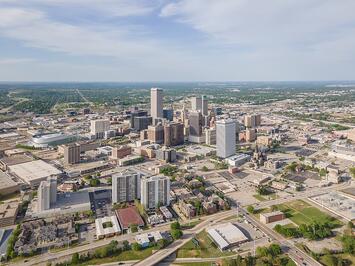
When I heard that New York University (NYU) was creating a new campus not in some global capital but in Oklahoma—the fairly conservative west-south-central region of the United States—I was shocked, but also thrilled. NYU announced its decision to open a campus in Tulsa’s downtown Arts District, noting that “NYU Tulsa will be the university’s fourth global network location in the United States, joining its main campus in New York and other academic centers in Washington, DC, and Los Angeles.” While the Tulsa program will be relatively small to start, NYU will pilot a program that could promote viewpoint diversity for its undergraduates and may show critics of higher education that there remains real value in collegiate experiences.
I am incredibly optimistic about NYU Tulsa. NYU is putting a stake in the ground in a city and region that is remarkably different from the wealthy, global cities where NYU has typically built campuses. Whereas New York, Washington, and Los Angeles are firmly international in character and run by Democrats, Tulsa is a growing and diversifying city which has had a Republican mayor for the past 15 years. Tulsa, too, has an economic legacy based on oil, as opposed to finance or creative capital industries, and no Democratic presidential candidate has won in Tulsa County since Franklin D. Roosevelt in his 1936 landslide.
While colleges operate in their own bubbles, having students who start in New York but then attend classes and live in vastly different environments will force them to confront different ways of life. Students will necessarily be exposed to ideological diversity and will have to engage with different communities and cultures. Confronting and connecting with dissimilar ideas, traditions, and people can fundamentally change biases and open minds to new ideas and ways of thinking. Having new, eye-opening experiences that can lead to creativity and reflection is the power of a true liberal collegiate experience.
This was my exact experience when I left the Philadelphia region over two decades ago and went 3,000 miles west to California for my first year of college. Despite traveling before college and experiencing new cultures, residing in the Bay Area was a huge culture shock. I quickly confronted the fact that the institutions, demographics, history, values, and practices in the San Francisco Bay Area were vastly different from the East Coast Jewish community I was used to.
At first, so much out west was jarring. I often felt disconnected and isolated. While I struggled and learned to navigate this new environment, my life was deeply enriched by seeing and learning from worlds and communities unlike those I knew in the mid-Atlantic corridor. I will never forget having misunderstandings and heated discussions about life, values, and faith with my dorm mates, my first Día de los Muertos celebration in San José, or my initial visit to Oakland and having my first sip of bubble tea with my new college friends.
Outside of campus life, my prejudices and views were challenged, and enhanced, by the Bay Area’s culture. While colleges and universities are considered “echo-chambers,” they are embedded in the socio-geographic and economic environments of the local communities they inhabit. College towns have a unique ability to influence the views and experiences of the students who live there.
Read the rest of this piece at AEI.
Samuel J. Abrams is a profesor of politics at Sarah Lawrence College and a nonresident senior fellow at the American Enterprise Institute.
Photo: Nils Huenerfuerst, via Wikimedia under CC 4.0 License.












